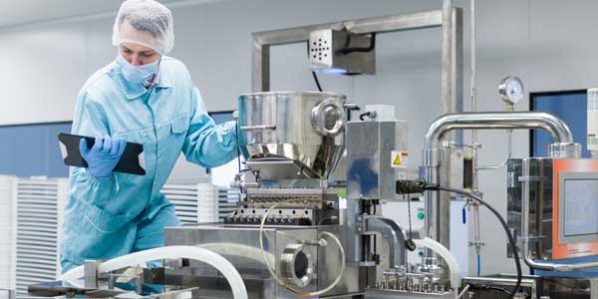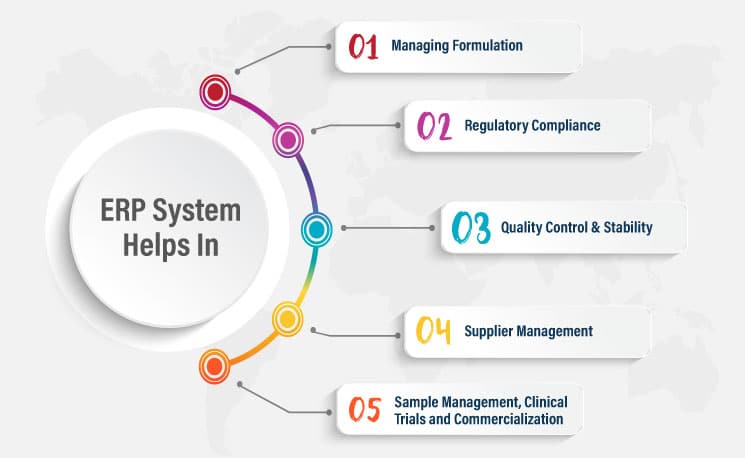
In the present times, many challenges threaten to bog down the pharmaceutical industry, which has achieved colossal proportions with its operations spreading to the manufacturing of drugs, vaccinations, and medical devices, among others.
The industry faces numerous business challenges such as heavy regulatory requirements, radical healthcare reforms, an informed & demanding consumer base, volatile market trends, traceability and quality control challenges, and tight global competition.
In such times, it has become imperative for the pharma manufacturers as well as the private labelers or so-called contract manufacturers, to maintain the highest quality standards across all processes.
Also, creating such supreme quality products that too at compelling prices is an added challenge.
To achieve this objective, the manufacturers need to have a system in place that throws accurate, actionable information in time.
Having a system that efficiently centralizes management, quickens decision-making, helps reduce costs, streamlines operations, and maximizes efficiency, is a profitable investment.
Such a system must also help improve the manufacturing processes in general in addition to patient safety, quality, hygiene standards, etc.
Pharma ERP software perfectly fits the bill
An enterprise resource planning (ERP) system emerges as the system that helps pharmaceutical manufacturers meet the aforementioned needs. It flawlessly links all the departments, integrates all the internal processes, and automates all the key functions.
Not just this, the ERP software for pharma also helps manufacturers keep a track of sensitive operations across the organization, such as compliance, expiry management, quality, formulation, costing, yield, and more. Consequently, the pharma manufacturing businesses operate at greater levels of efficiency and profitably.
How ERP Does This?
Acting as the central nervous system of the pharma manufacturing unit, an ERP system interconnects the autonomous processes such as planning, procurement, inventory, sales, marketing, and production among others.
It gathers real-time data from all departments and provides one centralized & secure repository to make the data accessible for every department.
What is achieved out of it is increases productivity, as the data is being used by everyone cohesively without any hassle.
This seamlessly syncs all the departments, enhances transparency in operations and facilitates the smooth functioning of the entire pharma manufacturing unit.
An ERP for Pharmaceuticals meets not just the operational requirements of the industry, it also helps the pharmaceutical manufacturing industry meet its unique requirements interms of quality, compliance, finance, reporting and such.
Although, there are many ways in which an ERP software can serve the pharma industry, but described here are the five predominant ones. Take a look:

Through effectively managing formulation:
In any process manufacturing industry, and more so in the pharma manufacturing industry, formulation management holds great significance.
A formula is developed after intense research and hard work, and thus it must be managed efficiently. And that, actually decides whether the business is successful or not.
An ERP system for pharmaceutical manufacturing helps manufacturers manage all the essential aspects of formulation, including storing, retrieving, and securing every formula used in the business, and maintaining countless manufacturing instructions.
Through its functionalities such as formula security, patenting, formula approval, formula sizing, multiple packaging of the same formulation, etc., pharma ERP software makes formulation management a cake walk for pharma manufacturers or even contract manufacturers.
By helping meet regulatory compliance:
For pharmaceutical manufacturers, it is mandatory to meet the industry, environmental, and regulatory requirements.
And pharma ERP software helps in this regard. It ensures that the business follows cGMP and meets all the local & global regulatory compliances such as the FDA CFR 21 Part 11, Bio-terrorism, etc.
The exquisite features such as workflows, execution of SOPs, customer-centric COA, approval controls, generating BMR plus MBR, and audit trails, make meeting compliance easier.
As ERP facilitates the pharma manufacturers by helping create a business model which adheres to all the industry rules and government regulations.
Helping with Quality Control & Traceability:
The pharma manufacturers need to ensure that the products they manufacture are completely safe and fit for consumption, and are of top quality.
To ensure this, they also need the capability to quickly identify where, when, and what goes wrong at their manufacturing plant, and fix it.
What they need is a pharma ERP software with strong Quality Control (QC) that allows for defining tests, drawing samples as per industry-defined norms, double testing, and storing test results in numeric, and alphanumeric as well as pass/fail formats, among others.
The QC module ensures full conformance with cGMP by allowing only the appropriate materials to be sent for production, while rejecting & sending the inappropriate ones for destruction, scrapping, return, etc. along with their proper documentation. NC, CAPA, adverse event reporting, etc are other important aspects handled by an ERP perfectly.
Also, the ERP system allows the manufacturers to trace and track ingredients through the supply chain from procurement to final sale and enables swift product recalls through its bi-directional traceability functionality.
Thorough material & supplier management:
A good pharma ERP software helps manufacturers identify the quantity of material required for production, set targets, and create triggers for purchase and replenishment.
Through its state-of-the-art features, it allows monitoring of material usage scientifically, reconciling inventory balances, and cutting down the instances of material wastage.
Additionally, an ERP system for pharmaceutical manufacturing allows the manufacturers to procure raw materials from only the recognized suppliers who have the ‘Supplier Verification’ and restricts buying material from vendors whose certifications are nearing expiry or have expired. This way, not only do the high-quality, and safe materials enter the system, but a lot of documentation work is reduced in each deal.
By providing support to sample management, and commercialization:
It’s a known fact that extensive clinical trials, rigorous sample testing, long product life cycles, etc. are an integral part of the pharma manufacturing process. Keeping a record of these samples manually is simply not possible, as it could lead to costly errors.
An ERP system for pharmaceutical manufacturing allows maintaining such records. It also lists the trial histories in a centralized database that can be accessed anytime, especially for reference use and audit purpose.
Moreover, ERP also provides complete sample management of samples sent to the customers. Right from getting specifications for samples, communication with the customer, its costing, tracking, approval/rejection, an ERP handles all.
Similarly, we are aware that a lot goes into researching and developing a drug, and the manufacturers often find it difficult to get approval for the same. Post-approval, the preparation for its market launch begins.
Thus the pharma manufacturers rely upon a system that can manage these complex, multi-layered processes involved in launching a product.
And that system is a pharma manufacturing software, which provides support to commercialization, and all the processes such as manufacturing, sales and marketing, production planning, and quality management, among others.
Conclusion
As the markets continue to shrink, pharma ERP software has become an indispensable part of pharmaceutical manufacturing businesses.
Though they help pharmaceutical industries in more ways than one, we discussed in this blog the five most important of those ways.
If you own a pharma manufacturing business or do contract manufacturing, and are looking to re-engineer your processes to maintain quality in the wake of existing challenges, getting an ERP system for pharmaceutical manufacturing onboard is the key to scaling and growing your business. Experts at BatchMaster Software can help with one such software.



















